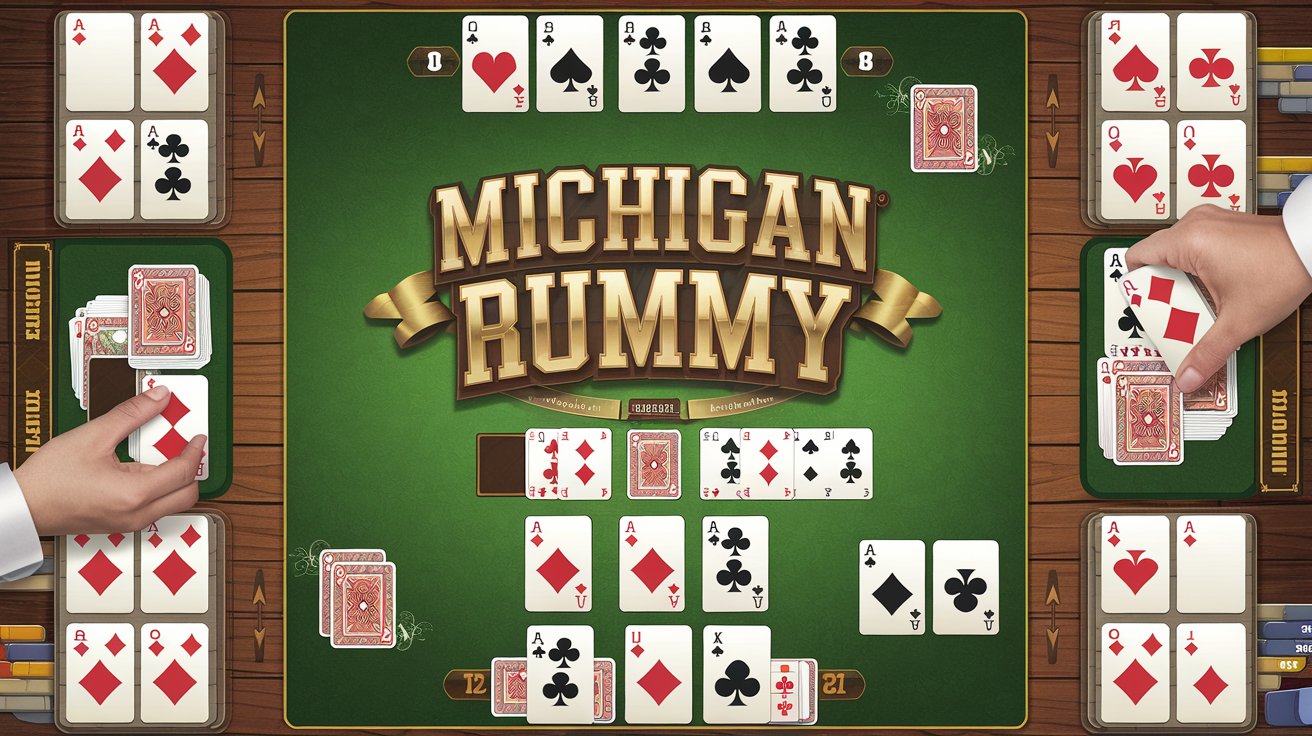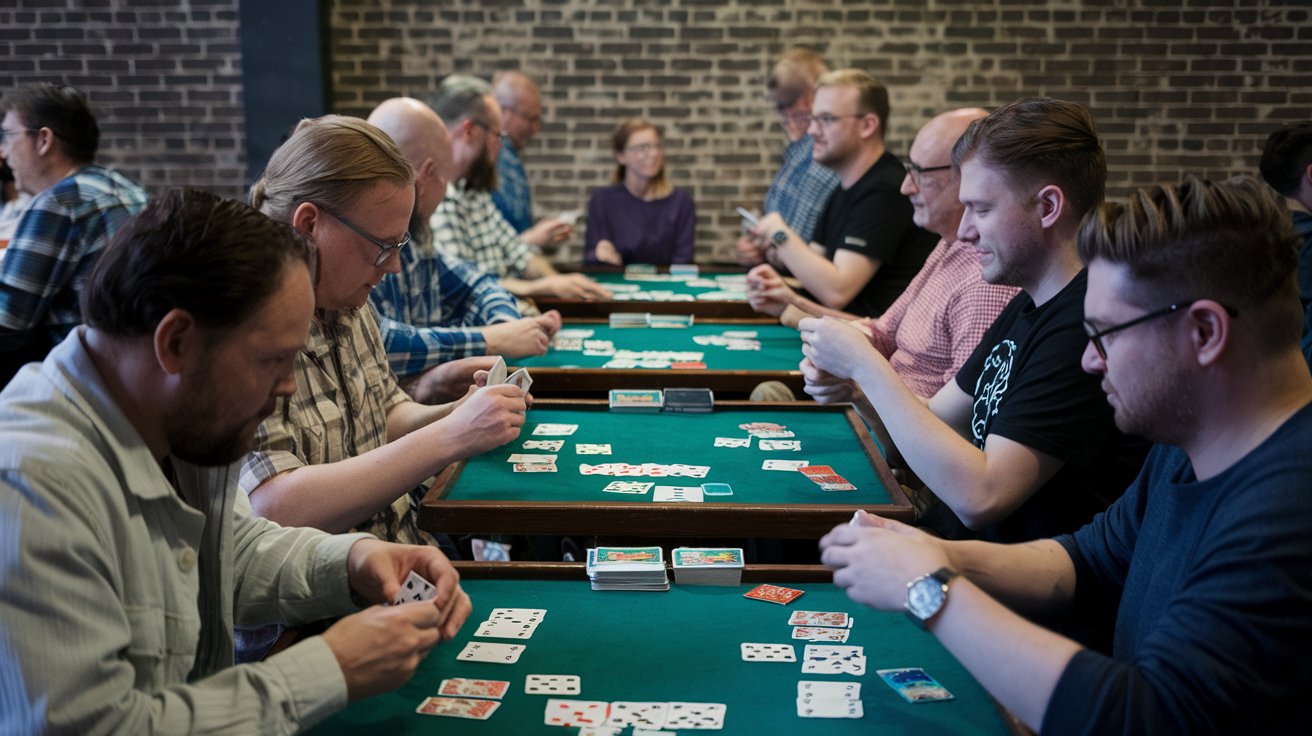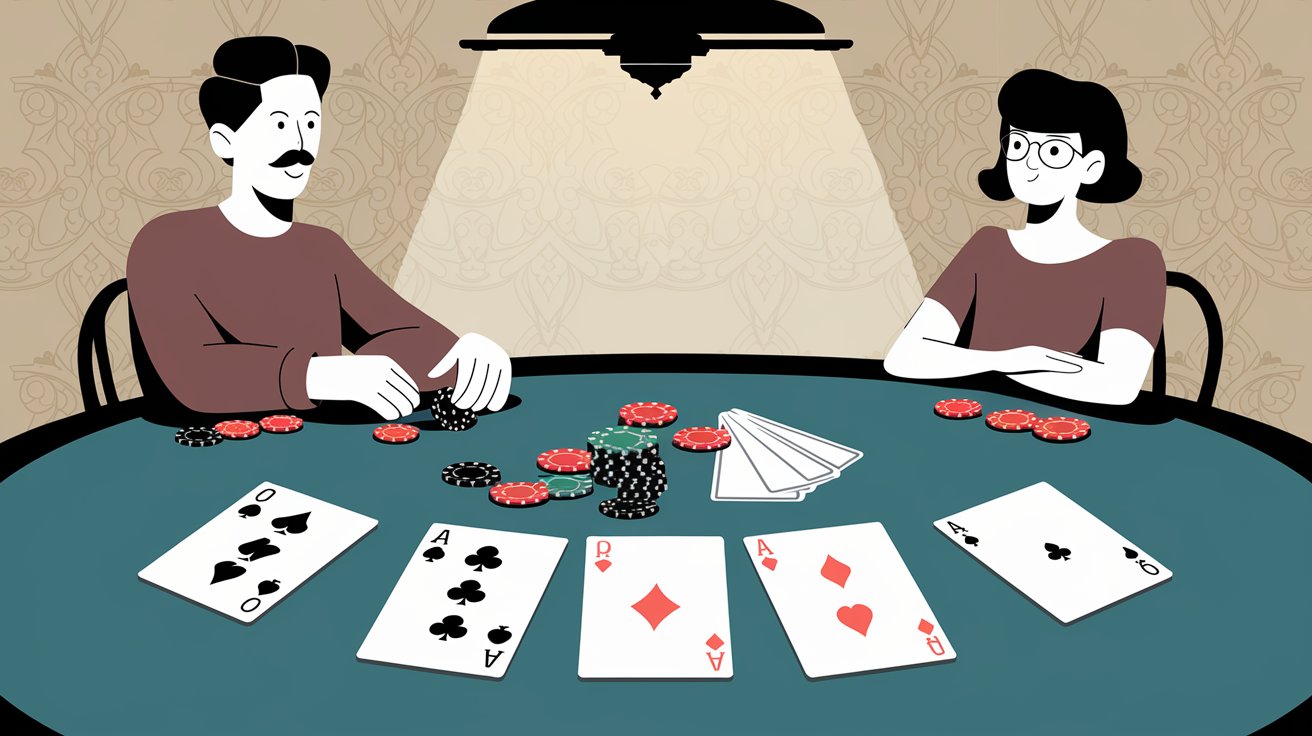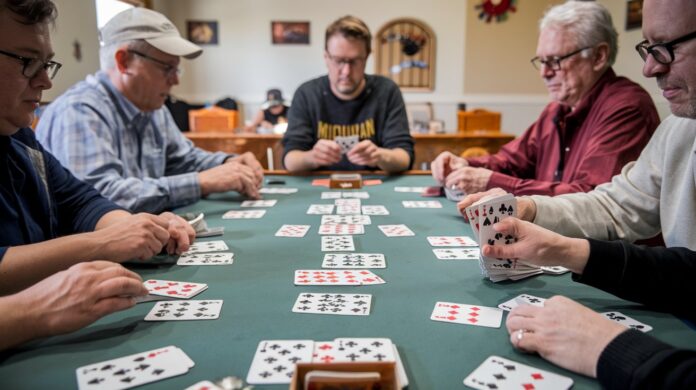Michigan Rummy, also known as Boodle, Tripoley, or Michigan, stands out as one of the most engaging and sociable card games in the rummy family. Combining elements of traditional rummy with poker and betting mechanics, this unique variant has been a staple at family gatherings and social events for generations. Whether you’re looking to add a new game to your repertoire or curious about this distinctive rummy variation, this comprehensive guide will walk you through everything you need to know about Michigan Rummy.
Introduction to Michigan Rummy

Michigan Rummy differs significantly from standard rummy games, incorporating elements that make it more dynamic and interactive. Unlike traditional rummy where players work independently to form melds, Michigan Rummy creates a community experience where players follow a sequence of play that resembles a journey around a board. The game features a special playing board (or layout), betting mechanics, and special hand combinations that bring together aspects of rummy, poker, and even hearts.
What makes Michigan Rummy particularly appealing is its social nature and the blend of strategy and luck that keeps players of all skill levels engaged throughout the game. It’s an excellent choice for gatherings where you want a game that’s easy to learn but offers enough depth to remain interesting after multiple plays.
Origins and History
The exact origins of Michigan Rummy are somewhat murky, as is common with many traditional card games. The game likely developed in the Midwestern United States in the early 20th century, with Michigan being the suspected birthplace (hence the name). It gained popularity during the 1930s and 1940s, spreading throughout North America as a favorite social game.
The commercial version known as Tripoley was trademarked in the 1940s by the Cadaco company, which helped standardize the rules and increase the game’s popularity. Today, Michigan Rummy continues to be played in various forms, often with house rules that reflect regional or family traditions.
Equipment Needed
To play a proper game of Michigan Rummy, you’ll need:
- Standard deck of 52 playing cards
- Michigan Rummy board or layout (commercially available, or you can make your own)
- Betting chips or tokens (pennies or other small objects can substitute)
- Flat playing surface with enough room for the board and players’ cards
- 3-8 players (the game works best with 4-6)
The Michigan Rummy board typically features spaces for specific card combinations and a sequence of numbered spots (usually 9-Ace) that will guide the flow of play.
Basic Gameplay Concepts

Before diving into the detailed rules, let’s understand the core concepts that make Michigan Rummy unique:
The Layout
The heart of Michigan Rummy is the layout or board, which typically includes:
- A central pot area
- Specific spots for special combinations (often “Kitty,” “Hearts,” and “Michigan”)
- A sequence of spots for numbered cards from 9 to Ace
The Phases of Play
Michigan Rummy consists of three distinct phases:
- Betting phase: Players place bets on specific combinations or card positions
- Deal phase: Cards are dealt to players and to the layout
- Play phase: Cards are played in sequence, following specific rules
Special Combinations
The three most common special combinations in Michigan Rummy are:
- Kitty: A combination of King and Queen of the same suit
- Hearts: The highest heart card played in the game
- Michigan: A specific run of cards (typically 9-10-J-Q-K-A) in the same suit
Detailed Rules and Gameplay
Now that we understand the basic concepts, let’s explore how to play Michigan Rummy step by step:
Setup
- Place the Michigan Rummy board in the center of the table.
- Distribute an equal number of chips or tokens to each player.
- Determine a dealer (often by drawing cards, with the highest card becoming the dealer).
- Decide on bet amounts for the game.
Betting Phase
- Each player places bets on the board according to their strategy:
- Central pot: Everyone contributes equally to this pot.
- Special combinations: Players can bet on Kitty, Hearts, and Michigan.
- Number sequence: Players can place bets on any numbered spot on the board.
- Players are not required to bet on all positions but must contribute to the central pot.
Deal Phase
- The dealer shuffles the deck thoroughly.
- Deal cards one at a time, face-down, to each player until everyone has received an equal number of cards (typically 7-9 cards, depending on the number of players).
- After dealing to players, deal one card face-up to each position on the layout that has a bet on it.
- Any cards left over go into a “widow” or “kitty” pile and are not used in this round.
Play Phase
- The player to the dealer’s left begins by playing any card they wish.
- Play continues clockwise, with each player following specific rules:
- If a player has a card that matches the sequence (starting from 9 and moving up to Ace), they must play it.
- If a player has a card matching the current sequence but of a different suit than the one started, they can play it.
- If a player cannot play a matching card, they pass.
- The first player to play a card in the sequence (e.g., the first 9) collects any chips bet on that position.
- Special combinations work as follows:
- Kitty: The player who plays both the King and Queen of the same suit collects this pot.
- Hearts: The player who plays the highest heart card during the game collects this pot.
- Michigan: The player who plays the last card in the Michigan sequence collects this pot.
- The round ends when all players have played all their cards, or when no more cards can be legally played.
Winning the Game
The player with the most chips at the end of an agreed-upon number of rounds wins the game. Alternatively, you can play until one player has accumulated a predetermined number of chips.
Variations of Michigan Rummy

Like many traditional card games, Michigan Rummy has evolved into several variations:
Tripoley
The commercial version of Michigan Rummy adds poker elements:
- Includes additional betting spots for poker hands like “flush,” “straight,” etc.
- Often played with a special Tripoley mat that includes these betting areas
- May include special rules for wild cards
Poker Michigan
This variation emphasizes the poker aspects:
- Players are dealt poker hands at the beginning
- Best hand wins a special pot
- Regular Michigan Rummy gameplay follows
Hearts Michigan
Emphasizes the hearts component:
- All hearts have special value
- The player capturing the most hearts wins a bonus pot
- May include special rules for the Queen of Spades (similar to the Hearts card game)
Progressive Michigan
A longer form of the game:
- The dealer position changes after each hand
- Betting minimums increase with each round
- Often played with a running score rather than chips
Strategy Tips
While Michigan Rummy involves a considerable element of luck, skilled players can improve their chances with these strategies:
Betting Strategy
- Diversify your bets: Don’t put all your chips on one combination or sequence.
- Watch what others bet on: If many players bet on the same spot, the potential reward decreases.
- Pay attention to the central pot: This is often the largest pot and worth strategizing around.
Card Play Strategy
- Track the cards: Pay attention to which cards have been played, especially in sequences.
- Plan your sequence: If you have multiple cards in the sequence, plan how to maximize your winnings.
- Save key cards: If you have both a King and Queen of the same suit, try to maintain control of when they’re played.
Hand Management
- Balance your hand: Try to keep cards that can win you pots while discarding less valuable cards.
- Position matters: Being the player who goes right after someone unable to continue a sequence can be advantageous.
- Heart strategy: If you’re pursuing the Hearts pot, keep track of which hearts have been played.
Tips for Beginners
If you’re new to Michigan Rummy, these tips will help you get started:
Learning the Game
- Start with small bets: While learning, use minimal betting amounts to reduce pressure.
- Play open-handed: For the first few rounds, consider playing with cards visible to help everyone understand the flow.
- Focus on basics: Initially, concentrate on understanding the sequence of play before worrying about complex strategies.
Common Mistakes to Avoid
- Betting too heavily on unlikely combinations: Spread your bets more evenly when starting out.
- Forgetting the sequence: Keep a mental note of which card in the sequence is currently in play.
- Overlooking the Hearts pot: This can be an easy pot to win if other players aren’t paying attention.
House Rules Clarification
- Establish rules upfront: Before playing, make sure everyone understands any house rules being used.
- Clarify special combinations: Ensure everyone knows exactly which cards constitute the “Michigan” combination.
- Set betting limits: Agree on minimum and maximum bets to keep the game enjoyable for all.
Social Aspects of Michigan Rummy
One of Michigan Rummy’s greatest strengths is its social nature:
Game Night Ideas
- Michigan Rummy tournament: Organize a mini-tournament with progressive rounds.
- Theme night: Combine with appropriate snacks and drinks for a complete Michigan experience.
- Family tradition: Many families pass down their version of Michigan Rummy through generations.
Teaching Others
- Start simple: Begin with just the sequence play before adding special combinations.
- Demonstrate a round: Play through a sample round with explanations before starting for real.
- Be patient: The unique flow of Michigan Rummy can take a round or two to fully grasp.
Michigan Rummy vs. Other Card Games
How does Michigan Rummy compare to other popular card games?
Compared to Traditional Rummy
- Michigan Rummy has betting elements that standard rummy lacks
- The sequence of play is more structured than in traditional rummy
- Special combinations differ significantly from the melds in standard rummy
Compared to Poker
- Michigan Rummy involves more players actively participating throughout the hand
- The betting structure is fixed rather than the raising mechanics of poker
- Winning depends more on card sequence than hand strength
Compared to Hearts
- Michigan Rummy incorporates some elements of hearts (especially in the Hearts pot)
- The gameplay flow is more complex than standard hearts
- Betting adds a dimension not present in traditional hearts
Frequently Asked Questions
“How many chips should each player start with?”
Typically, each player starts with 50-100 chips, depending on how long you want the game to last. For casual games, 50 chips is usually sufficient.
“What happens if no one can complete the Michigan sequence?”
If no player can complete the Michigan sequence, those chips remain on the board for the next round, creating a larger pot.
“Can I pick up cards from the layout?”
No, cards placed on the layout remain there for the duration of the round. Only betting chips are collected by players.
“What if I have multiple cards of the same rank in the sequence?”
If you have multiple cards of the same rank (e.g., two 9s), you can choose which one to play. This choice might be influenced by your strategy for completing special combinations.
Conclusion
Michigan Rummy offers a delightful blend of strategy, luck, and social interaction that has kept it popular for generations. Its unique combination of rummy elements, betting mechanics, and special combinations creates a game that’s both accessible to newcomers and engaging for experienced card players.
Unlike many other card games that focus purely on competition, Michigan Rummy creates a communal experience where players participate in building the layout together while strategizing for their own advantage. This balance makes it an excellent choice for family gatherings, friendly get-togethers, or regular game nights.
Whether you’re drawn to the strategic aspects, the betting elements, or simply the joy of playing cards with friends and family, Michigan Rummy offers something for everyone. With various adaptations and house rules, you can customize the experience to suit your group’s preferences and create your own Michigan Rummy traditions.
So gather your cards, set up your layout, distribute those chips, and embark on the unique journey that is Michigan Rummy—a card game that continues to charm players with its distinctive blend of familiar elements and unique mechanics.

Zareb Saleh is a journalist at Gulf Today and a ghostwriter for Gameoholic, specializing in gaming, technology, and digital culture. With a keen eye for industry trends, he delivers insightful stories that engage and inform readers.




